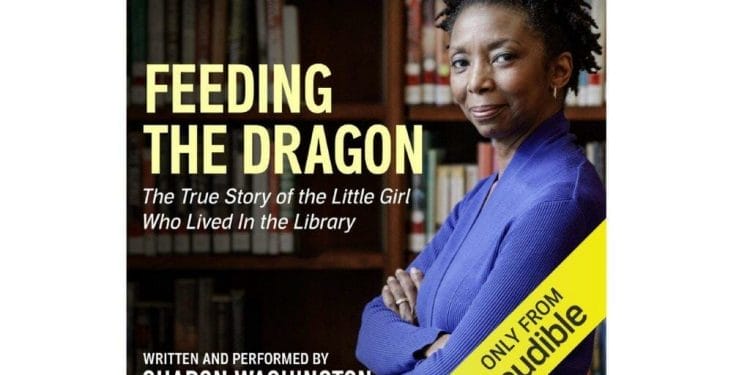 Living inside a library, literally, may not be the conventional starting point for a story about a ‘typical’ family, but Sharon Washington’s autobiographical solo play reminds us that family life tends to follow a pattern, no matter where that family calls home. Released as an Audible Original Studio Recording, Feeding The Dragon, which originally ran off-Broadway in 2018, tells the story of a “child of two worlds.”
Living inside a library, literally, may not be the conventional starting point for a story about a ‘typical’ family, but Sharon Washington’s autobiographical solo play reminds us that family life tends to follow a pattern, no matter where that family calls home. Released as an Audible Original Studio Recording, Feeding The Dragon, which originally ran off-Broadway in 2018, tells the story of a “child of two worlds.”
The younger Sharon occupies an enviable position for young bibliophiles, when her mother fell pregnant at 42, she was told the child would either be “very intelligent or mongoloid.” For four years in the early seventies, her Father was caretaker at the St. Agnes branch of the New York Public Library, a position that came with a large apartment in the upper echelons of the building. Down in the basement, the large coal furnace that her father has to continually feed with coal becomes the titular dragon, at least in the studious young girl’s eyes.
Perhaps as a result of her surroundings, or perhaps because of her mothers age, Sharon does turn out to be very intelligent, and wins a scholarship to an elite school on the East Side. It is here that Sharon begins to witness first hand the class differences that exist in society, as she mixes with the well-heeled students of Dalton School, in stark contrast to those who surround her in her native Upper West Side.
Her father is an alcoholic, and her mother hoards stashes of gowns and gaudy jewellery that have never been taken out of their packaging. Like most families, there’s some degree of dysfunctionality, and it’s as Washington recounts events of her childhood that we start to understand some of the other characters motivations.
As well as the class, and to some extent, racial differences that Sharon witnesses, we also find ourselves in a unique time of societal change. It’s the early seventies and there’s a liberalism starting to erupt, we see a distinct dichotomy as on one hand Sharon is preparing to dress for a party at Studio 54, and on the other visits her grandmother in Charleston, a place where change has yet to arrive.
The narrative jumps around in places, meaning it’s sometimes difficult to grasp exactly where we are in the time line, but Feeding The Dragon often feels like a fairy tale being told to us by a young girl. Washington’s soothing American accent helps bring that ‘Once Upon a Time’ story to life, and is at it’s best when she’s talking in her own voice as opposed to some of the other characters.
Feeding The Dragon makes for a fascinating listen, the unusual surroundings of a ‘typical’ upbringing feed in to the notion that we are seeing not just the play develop, but Washington as an artist too.
Listen to Feeding The Dragon Here













